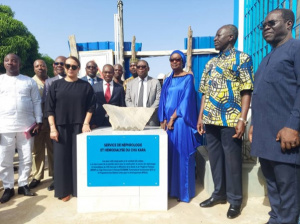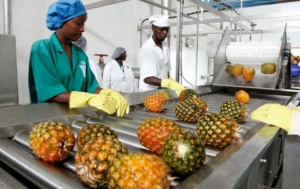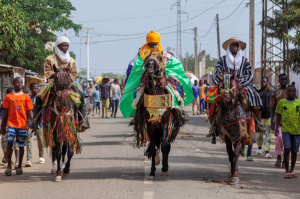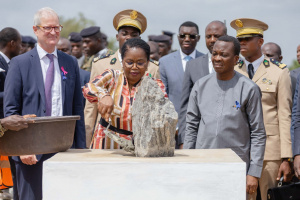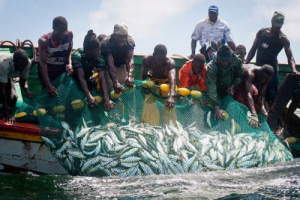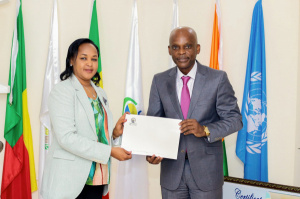Togo First
MCC 2025: Togo Validates 16 Indicators, Up from 14 in 2024
Togo has once more confirmed its eligibility for the Millennium Challenge Corporation (MCC) Compact program, a key funding initiative from the United States, by validating 16 out of 20 indicators for the MCC 2025. Togo had validated 14 indicators in 2023 and 2024, respectively.
This year, Togo successfully validated 7 of the 8 indicators related to "economic freedom." The country maintained its performance in "governing justly," confirming 5 out of 6 indicators, consistent with prior assessments. In the category of "investing in human capital," Togo validated 4 out of 6 indicators.
Among the newly validated indicators are natural resource protection, which received a score of 52 points, and the immunization rate, scoring 78.5 points. However, four indicators remain below the required thresholds. Political rights scored only 15 points, falling short of the minimum threshold of 17. Fiscal policy was also lacking, with a score of -6.6 compared to the expected median of -4.4. Health expenditure and child health scored 0.55 and 54.9 respectively, against medians of 1.11 and 60.5.
With these results, Togo retains its status as an eligible country for the Threshold program. At the same time, it continues striving to finalize its Compact agreement by the end of 2024.
Esaïe Edoh
Togo Launches Nephrology and Hemodialysis Center at Kara University Hospital
Togo’s Centre Hospitalier Universitaire (CHU) de Kara will soon have a nephrology and hemodialysis department. The project was officially kicked off on November 22, 2024, by Wotobé Kokou, Secretary General of the Ministry of Health and Public Hygiene.
Ecobank Group and the UN Development Programme (UNDP) back the CFA485.6 million project. Once completed, the center will provide crucial specialized care for patients suffering from renal failure in the Savanes, Kara, and Centre regions.
Patients who need hemodialysis in these regions must travel 300 to 600 kilometers to reach Lomé's CHU Sylvanus Olympio, the only public facility offering such services in northern Togo.
Seynabou Diaw Ba, UNDP Deputy Resident Representative in Togo, remarked that this project “is a step towards improving access to quality health services for all of us in Togo.”
Modern Infrastructure
The new facility will cover 800 m² and consist of two levels. It will feature several essential facilities, including a dialysis room, a water treatment room, a technical room, a storage warehouse, a construction room, and a catheter room, as well as dedicated areas such as a patient checkroom, waiting hall, and sanitary facilities. Additionally, provisions will be made for medical waste management.
Construction is expected to take 18 months. The center aims to reduce patient travel to Lomé and serve an educational purpose by hosting medical students and trainees from paramedical schools. This project is part of the government's broader program to renovate and strengthen health infrastructure as part of the rollout of the Universal Health Insurance (UHI) program.
Esaïe Edoh
Lire aussi:
Togo: CFA711 Billion in Electronic Money Transactions Recorded in 2023
In Togo, e-money transactions reached a total value of 711 billion FCFA in 2023. The Central Bank of West African States (BCEAO) disclosed the figure in report titled "Tableau de bord de la monétique régionale dans l'UEMOA à fin 2023". According to the document, released last August, the amount reported corresponds to about 7.95 million transactions.
In detail, withdrawals dominated the e-money landscape last year. They totaled CFA632 billion, or 88% of all transactions, value-wise. Withdrawals are made through cash dispensers (ATMs) and other electronic means. In comparison, bank card transactions were valued at around CFA570 billion five years ago in 2018.
In contrast, e-payments, made via bank cards, e-wallets, or payment platforms, amounted to CFA78 billion in 2023, or 10.9% of the total, value-wise. Cash advance transactions, which refer to cash advances obtained through bank cards, represented the smallest share, totaling just CFA362 million this year, or less than 1% of the overall volume.
Relative to card usage, nearly 430,000 cards (428,233) were circulating in Togo in 2023, accounting for 5.35% of all cards within the West African Economic and Monetary Union (WAEMU).
Ayi Renaud Dossavi
Togo: HAUQE Holds Workshop to Enhance Agri-Food Quality Standards
The High Authority for Environmental Quality (HAUQE) of Togo is holding a training workshop to bolster quality standards of agrifood products circulating in the country. The event started on November 19 and will last four days. It gathered 20 national experts who will be equipped with the necessary tools to help Togolese industries meet international quality standards.
“This certification training aims to guarantee the quality of products made in Togo. With the operationalization of the national quality infrastructure, our country must imperatively certify a certain number of products, particularly in the agri-food sector,” said Lare Arzouma Botre, president of HAUQE.
During the workshop, experts will learn to implement international standards, including the HACCP system, which focuses on identifying and preventing potential hazards in the production chain.
Quality consultant Nabila Okoulou-Kantchati noted more European and ECOWAS countries–and the US–have been demanding proof of product quality. Certification is thus becoming essential to get Togolese products across borders.
It is worth noting that the HAUQ recently launched certification programs for 31 food products made in Togo.
Lire aussi:
Togo to Revise National Biodiversity Strategy
Togo will revise its National Biodiversity Strategy and Action Plan (SPAN-B). Recently, local stakeholders held a validation workshop in Lomé in this framework. Organized by the Ministry of the Environment, the workshop aimed to help Togo align with global biodiversity standards, by integrating the 23 targets outlined in the Global Biodiversity Framework.
Jonas Komi Ante, who steers the revision project, highlighted key priorities such as preserving and restoring ecosystems, using resources sustainably, and financing biodiversity initiatives. Togo plans to engage local communities and the private sector in the process, stressing that collective efforts are needed to preserve biodiversity.
The revised strategy will have five objectives and 25 targets. Also, it will feature a multi-sectoral approach that includes contributions from private entities, youth, and women. Local authorities will also play an essential role in implementing the strategy.
Despite Togo's commitment to meeting its goals, challenges remain. A senior Ministry of Forest Resources official noted that a 2020 assessment revealed uneven progress toward national targets, with only 65% of awareness-raising efforts achieved.
Togo: Second Edition of Sokodé International Horse Festival Scheduled for January 2025
Sokodé, a Togolese city located about 350 km north of the capital, will host the second edition of the International Horse Festival from January 8 to 10, 2025. The festival celebrates the rich equestrian tradition of the Tchaoudjo prefecture. The next edition is expected to attract nearly 500 riders from Togo and neighboring countries, organizers told the press last weekend.
The three-day festival will feature several key activities, including an equestrian evening and a horse race. There will also be competitions where riders from various backgrounds compete for prizes awarded to the top five participants.
Festival promoter Ouro-Adoï Farrida emphasized that this event highlights a key aspect of Togo's cultural identity. “The prefecture of Tchaoudjo is historically recognized as a place of horsemen, and it is essential to support the actors of this tradition,” he said.
Beyond horse demonstrations, the festival will include a public conference titled "The Future of the Rider," featuring local and foreign riders, researchers, and experts. This forum will focus on preserving and passing down equestrian culture in a modern context where traditional practices have been losing ground.
Esaïe Edoh
Lire aussi:
Togo: A New Cancer Treatment Center Under Construction in Lomé
Togo is building a new cancer treatment center focused on radiotherapy and nuclear medicine in Lomé. Prime Minister Victoire Tomégah-Dogbé laid the foundation stone for the facility on November 15, 2024. She was with the Minister of Health, Prof. Tchin Darré, and the President of the National Assembly, Sevon-Tépé Kodjo Adédzé.
Located at the Camp du 1er BIR in the Agoè-Nyivé 1 municipality, the new center will span 1,600 square meters. It will be equipped with advanced technologies to provide modern treatments for patients. Backed by AME International, an Austrian partner, the project aims to make cancer treatment more accessible and reduce mortality rates in Togo.
"This center will remain a gift for today that will forever determine the hope of tomorrow," said Prof. Tchin Darré, emphasizing the commitment to building a stronger Togo in the fight against cancer. This will be Togo’s second cancer treatment center. The first, the Centre international de cancérologie de Lomé, opened in 2022.
Data from 2022 indicates that Togo officially records over 7,000 cases annually, including nearly 900 pediatric cases. The number of cases has risen in recent years.
Ayi Renaud Dossavi
Togo: Fishing at Lake Nangbéto Officially Resumes
After a three-month suspension to preserve fishery resources, fishing at Lake Nangbéto has officially resumed. Fishery Minister, Yark Damehame, announced the news on November 15.
The official, however, indicated that the resumption comes with strict restrictions, including interdiction to use certain fishing techniques and equipment deemed destructive. These include gill nets or hawks nets with mesh sizes smaller than two and a half fingers, shore stages, pots with mesh sizes less than three fingers, and devices such as bamboo.
Additionally, practices like barré-barré, unbaited longlining, and the use of toxic products are strictly banned. These measures aim to limit fishing's negative impact on the Lake's resources and promote their long-term regeneration.
Minister Damehame also emphasized that fishermen need a permit issued by the Directorate of Fisheries and Aquaculture to fish on the Lake. This regulatory system is designed to provide a better framework for fishing activities and ensure compliance with standards to protect the ecosystem.
The fishing sector is vital to the Togolese economy, directly employing over 22,000 people and accounting for about 4.5% of gross domestic product (GDP), according to official data.
Esaïe Edoh
Togo's NanaTech Program Completes First Training Cycle for Women Entrepreneurs
NanaTech Entrepreneures, part of Togo's Ministry of Digital Economy and Transformation's NanaTech digital program, is celebrating its first cohort. The six-month initiative concluded with a Demo Day on November 16 in Lomé, where the 45 women participants presented their projects to investors and industry partners. During the ceremony, certificates of participation were awarded to the beneficiaries.
Digital Economy Minister, Cina Lawson, lauded the program's success, saying: "We want digital to be centered on people, and in particular on women, to be able to become a hub of digital innovation. So we expect them to come back to us in a few months and tell us how the training has supported them."
NanaTech Entrepreneures has enhanced female entrepreneurs' ability to use digital tools, improve business management, and expand their markets internationally through e-commerce. Projects presented included "Soke's Hands," a brand of handcrafted bags made from luxury pearls; "FaithProduct," an enriched flour company; and "Sunclay," a brand of natural clay-based cosmetics.
Funded by the Millennium Challenge Corporation and implemented by OMCA-Togo, NanaTech consists of five components. In addition to NanaTech Entrepreneures, these include NanaTech Immersion (a six-day intensive training program), NanaTech Écosystème (nationwide roundtables to strengthen the female entrepreneurial ecosystem), NanaTech Lab (an online training platform), and NanaTech Talents (a month-long program focused on developing entrepreneurship and digital skills among startups).
Ayi Renaud Dossavi
Rwanda Appoints New High Commissioner to Togo
Rwanda has appointed a new representative in Togo: Rosemary Mbabazi. On November 18, 2024, she presented her credentials as Rwanda's High Commissioner to Togo to the Togolese Minister of Foreign Affairs, Prof. Robert Dussey. The two diplomats discussed areas of cooperation between their countries.
Rosemary Mbabazi is a politician and businesswoman who previously served as Minister of Youth. Her new role includes taking responsibilities for several countries in the sub region, including Ghana, Benin, Côte d'Ivoire, Sierra Leone, and Liberia.
Togo and Rwanda have maintained a close diplomatic relationship for many years. Last August, Togolese President Faure Gnassingbé visited Kigali for the inauguration of President Paul Kagame, where they talked about diversifying their bilateral partnership and improving trade across the continent, especially in relation to the African Continental Free Trade Area (AfCFTA).


